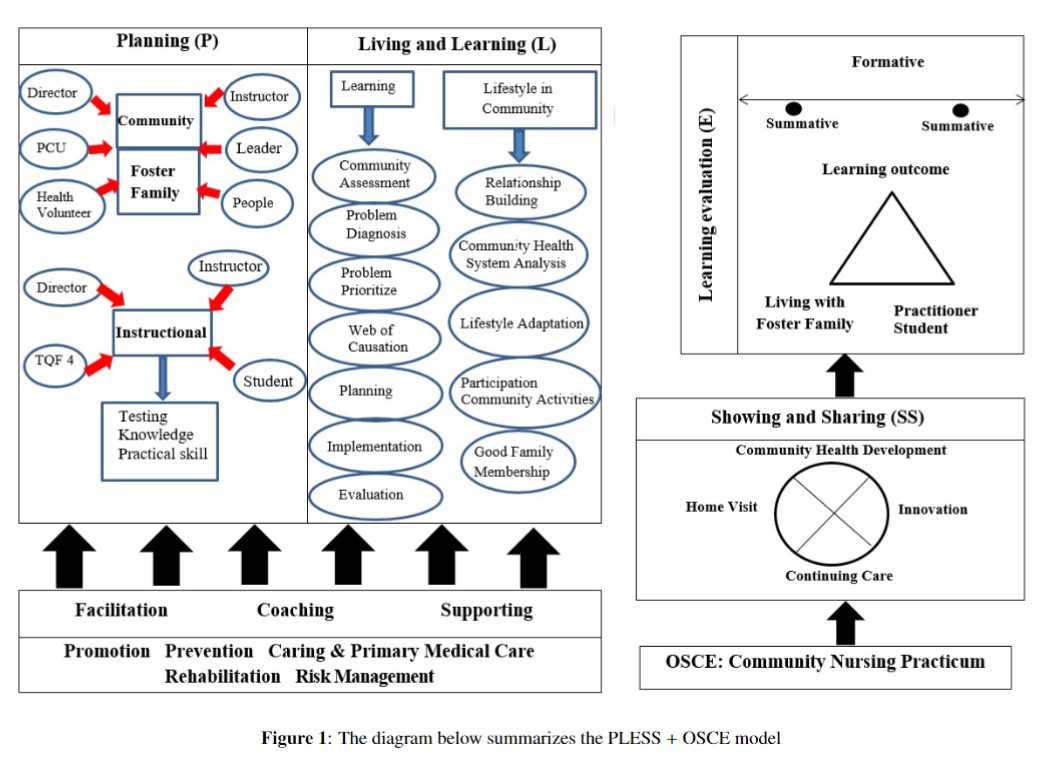Community–based teaching and learning management as the foster family in Thailand: PLESS + OSCE Model
Main Article Content
Abstract
The application of pragmatist epistemologies helps to develop community–based teaching and learning management. The multitude of benefits was foreseen from the intensive implementation of the concept of community participation which had positive outcomes for nursing students. A community–based learning management process for nursing students was developed. Students were immersed in the community by staying with host or foster families for a certain time period based on the designed
curriculum.
The integration of community participation with the Community Nursing Practicum II drew an expectation at a very high level of learning outcomes and satisfaction, as the nursing students were able to identify factors needed before becoming graduate nurses.
Therefore, community involvement enabled nursing students to get along with the community as residents as well became participative in almost all of the community activities. The nursing students developed the skills to think critically and creativelyas the main goal of comprehensive learning.
Article Details

This work is licensed under a Creative Commons Attribution-NonCommercial-NoDerivatives 4.0 International License.
References
World Bank participation sourcebook. Participatory Methods and Tools. http://siteresources.worldbank.org/,1996 (accessed 12 Sep 2018).
J. A. Fredricks, P. C. Blumenfeld, A. H. Paris. School engagement: Potential of the concept, state of the evidence. Review of educational research. 74 (1) (2004) 59–109.
A. M. Villanueva, M. E. Hovinga, J. L. Cass, Master of publichealth community–based practicum: students’ and preceptors’experiences. Journal of Public Health Management and Practice 17 (4) (2011) 337–343.
C. S. Peirce, How to Make Our Ideas Clear, Popular Science Monthly, 12 (1878) 286–302.
W. Waelveerakup, P. Chandanasotthi, Health promotion awareness through empowerment: Nakhon Pathom Rajabhat Nursing Students. In K. Laws, L. Herbon, C. Wescombe, (Eds). Supporting professional development with learning through action projects research from Australia & Southeast Asia. Pranakhon Rajabhat University, Thailand for DEPISA. (DEPISA Monograph no.2), 2013, pp. 161–172.
W. Waelveerakup, N. Chowsilpa, Developing an attitude toward the volunteer spirit of nursing students through extracurricular activities. In K. Laws, L. Herbon, C. Wescombe, (Eds). Investigations into professional practice: Learning from action research projects: Australia & Southeast Asia. Nakhon Si Thammarat Rajabhat University, Thailand for DEPISA. (DEPISA Monograph no.4), 2016 , pp. 145–151.
W. Waelveerakup, Small group teaching for Nursing Students. In K. Laws, L. Herbon, C. Wescombe, (Eds). Supporting professional learning in Southeast Asian university through DEPISA. Pranakhon Rajabhat University, Thailand for DEPISA. (DEPISA Monograph no.5), 2018, pp.78–82.
W. Waelveerakup, P. Suksaphonlarte, Using reflective teaching to create cohesion between the discipline and practice of community nursing. In K. Laws, L. Herbon, C. Wescombe, (Eds). DEPISA and Professional Learning in the 21st Century (DEPISA Monograph no.6), 2020, pp. 52–56.
National Qualifications Framework for Higher Education in Thailand. Implementation handbook. http://www.mua.go.th/users/, 2012 (accessed 12 Sep 2018).
L. M. Smith, H. Emmett, M. Woods, Experiential learning driving community–based nursing curriculum. Rural Remote Health 8 (3) (2008) 901.


